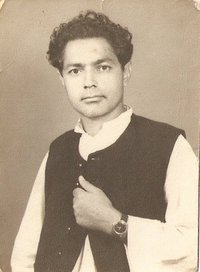Mohammad Shakeel
This article needs additional citations for verification. (September 2012) |
Mohammad Shakeel | |
|---|---|
 | |
| Member of the Uttar Pradesh Legislative Assembly for Lucknow West | |
| In office 1974–1979 | |
| Preceded by | Syed Ali Zaheer |
| Succeeded by | Zafar Ali Naqvi |
| Personal details | |
| Born | Lucknow |
| Died | 24 December 2007[1] Lucknow |
| Resting place | Lucknow |
| Nationality | Indian |
| Political party | Indian National Congress |
| Other political affiliations | Revolutionary Communist Party of India, Praja Socialist Party |
| Spouse | Begum Akhtar Jehan |
| Relations | son of Hakim Abdul Aziz |
| Children | 3 |
| Residence(s) | Akbari Gate, Lucknow |
| Occupation | Trade union activist |
| Profession | Labour lawyer |
| Committees | Executive Committee, Lucknow Municipal Corporation |
M Shakeel (full name: Mohammad Shakeel, alt: M Shakil) was an Indian freedom fighter, politician, Urdu novelist, trade union activist and labour lawyer from the city of Lucknow, India.[2][3] Born in the famous Azizi family of physicians, he was the grandson of Hakim Abdul Aziz.[4]
Early life
[edit]Born in 1927, Shakeel joined the Indian National Movement in his youth,[5][6] and was imprisoned by the British at the age of 14 years.[7] Though released after 21 days, he was arrested several times again over the years for delivering inflammatory speeches. After the independence of India, Shakeel joined the Praja Socialist Party, and remained a companion of Jayaprakash Narayan, Ram Manohar Lohia and Acharya Kriplani.[citation needed] His wife, Begum Akhtar Jehan, was herself an educationist and principal of the Kashmiri Mohalla Girls' School.[citation needed]
Political career
[edit]In 1960, Shakeel was elected to the first Lucknow Municipal Corporation, and undertook social work in establishing the Nakhas and Pratap Markets in Lucknow. After the dissolution of the Praja Socialist Party, Shakeel joined the Indian National Congress and won the 1974 Assembly elections from the densely populated Lucknow West constituency.[8][9]
Shakeel continued to argue labour cases for farmers, and trade unions throughout his career. He also served as President of Bhartiya Khadya Nigam Mazdooor Sangh. In 1976, he was instrumental in getting the practice of contractual labour for public cooperatives being abolished by the courts in Uttar Pradesh.[citation needed]
Legacy
[edit]
Shakeel's works in Urdu poetry and literature have been published by Kitabi Duniya. In 2011, recognising Shakeel's immense contributions to Lucknow, a road was named after him in the Old City.[10] This road lies next to another one named after his grandfather Hakim Abdul Aziz.[citation needed]
See also
[edit]References
[edit]- ^ Dainik Jagran. 28 December 2007.
{{cite news}}: Missing or empty|title=(help) - ^ "Details from the DNA newspaper". Archived from the original on 4 March 2016. Retrieved 21 July 2011.
- ^ Rashtriya Sahara. 31 October 2006.
{{cite news}}: Missing or empty|title=(help) - ^ Hakim Syed Zillur Rahman (1978). Tazkerah Khandan Azizi (2009 revised 2nd ed.). Aligarh/India: Ibn Sina Academy of Medieval Medicine and Sciences. pp. 228–229. ISBN 978-81-906070-6-3.
- ^ Dainik Jagran. 11 November 2006.
{{cite news}}: Missing or empty|title=(help) - ^ Dainik Jagran. 2 November 2006.
{{cite news}}: Missing or empty|title=(help) - ^ Rahman, Hakim Syed Zillur (August 1978). "Tahreek Azadi Main khandan Azizi Ka Hissa". Naya Daur. 35 (5): 28–32.
- ^ "Highlights of 1974 elections Govt. of India" (PDF). Archived from the original (PDF) on 28 January 2013. Retrieved 17 July 2011.
- ^ Hindustan. 8 April 2007.
{{cite news}}: Missing or empty|title=(help) - ^ Shakeel's contributions reported by Dainik Jagran newspaper
- 1927 births
- 2007 deaths
- Politicians from Lucknow
- Indian Muslims
- Indian National Congress politicians from Uttar Pradesh
- Urdu-language writers
- Trade unionists from Uttar Pradesh
- 20th-century Indian lawyers
- Uttar Pradesh MLAs 1974–1977
- Praja Socialist Party politicians
- Urdu-language poets from India
- Writers from Lucknow
- 20th-century Indian novelists
- Poets from Uttar Pradesh
- Novelists from Uttar Pradesh
